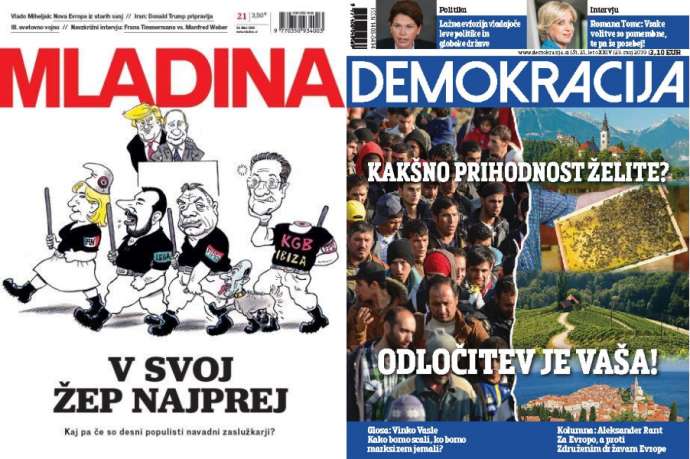Mladina: Voters Should Reject Neo-Fascism on Sunday
STA, 24 May 2019 - Taking a look at the state of things in Europe, the left-wing Mladina says on Friday European nations are in for a tough task at this year's EU elections, urging them to vote for parties which could prevent a rise in neo-fascism.
The weekly says the European political class has made compromises in the manner of British PM Neville Chamberlain and has let happen all that a united Europe should have prevented.
All those who believed with all their heart in the European project as a post-WWII safety mechanism against fascism are angry with this kind of Europe.
Slovenian voters will have some hard choices to make on Sunday, also because parties have come up with many rather unconvincing candidates.
Judging by opinion polls, only three parties among the normal Slovenian political parties - those which reject both populism and neo-fascism - have a realistic chance of getting MEPs: the coalition Social Democrats (SD) and the Marjan Šarec List (LMŠ) and the opposition Left.
Translated into political groups in the European Parliament, this means the Socialist and Democrats, ALDE and European United Left, says editor-in-chief Grega Repovž.
In principle, these are the parties, alongside the European Greens, which advocate the foundations of Europe and democracy and represent a bulwark against rising neo-fascism.
The stronger these groups in the European Parliament, the less possibility for Europe to fall into the abyss of fascism, as it did in the early 20th century.
The stronger these groups, the more likely the European People's Party (EPP) will not seek political alliances among the far-right groups.
Since the EPP will undoubtedly remain the strongest group, the elections are not about Europe becoming much better, but about not falling into the abyss again, Mladina says in the editorial headlined Above the Abyss.
Demokracija: A Stronger Border & Higher Pay for Police
STA, 23 May 2019 - Pointing out that police officers risk their lives while ensuring the country's security, the right-wing weekly Demokracija says in its latest editorial that they should be paid more for their efforts, including in strengthening the state and the EU's external Schengen border.
The weekly agrees with the Trade Union of Police Officers (SPS) and its president Kristjan Mlekuš about their take on the problematic situation at the Slovenian-Croatian border, saying that the union's reproval of the government is warranted due to the latter's inaction and lying about actively seeking new staff.
"Police officers are part of one of the most state-forming ministries... They should (like soldiers) be excluded from the public sector's pay system," says Jože Biščak, the editor-in-chief of the right-leaning weekly.
The commentary suggests the funds for their pay rise should be taken out of the amount allocated to NGOs, organisations which, according to the editorial, "would open borders and put citizens in danger" instead of protecting them.
"If they were allowed by the authorities, police officers would much rather be sent to the border and deter illegal migration than act as a fine collector with speed traps at straight road sections," says the editorial under the headline Life North of Kolpa, referring to the border river between Slovenia and Croatia.
Commenting on the state's refusal to strengthen the border security by sending more units and earmarking more funds, the weekly blames "the government's incompetence and incomprehensible empathy towards complete strangers" for the increasing amount of Arabs and Africans entering the country while Italy and Austria are closing its borders.
The EU elections are thus a way of giving one's support to parties which strive for security and preservation of national identities, tradition, culture and family values as well as "the advanced European civilisation", concludes the editorial.
All our posts in this series can be found here







